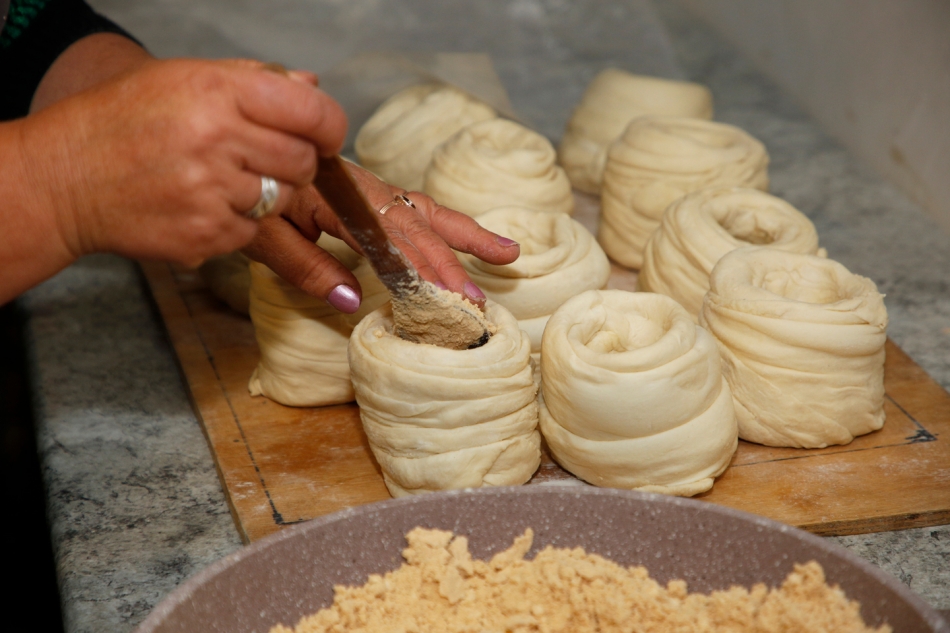Georgian red wheat bread revives tradition and sparks agritourism potential

When Zaza Ivanidze and his wife, Tinatin Chilingarashvili, first baked bread using flour from the ancient and endangered, local red wheat variety, akhaltsikhe tsiteli doli, on his tiny farm in Georgia, he found the taste took him on a nostalgic journey into the past.
"At first we were amazed by its flavor, which revived our childhood memories," the 40-year-old smallholder farmer says. "In time, we also learned that the bread is not only rich in nutrients but also has a longer shelf life." No wonder, he says, that many people these days believe that older generations lived longer, healthier lives.
Zaza says his grandfather, from whom he learned traditional baking techniques, lived to the age of 100. Matching the hardy constitution of the old man is the nature of the tenacious tsiteli doli that thrives in this southern Caucasian region, despite its poor soils and harsh climate of very cold winters and hot dry summers.
Zaza's first experiment with the bread, using a decade-old family recipe, was a new beginning for the economics graduate.
The next step came in October 2021, when Zaza and Tinatin opened a small bakery. There, they sell a variety of bread and pastries, made using the red wheat and other selected ingredients, baked in a wood-fired traditional stone oven. The result is baked goods that are both delicious and nutritious.
Most of their customers are locals who drop by the store or find out about it from their Facebook page. They've also organized on-the-spot tastings and distributed free bread samples to villagers and others drawn in by the tantalising smell of the loaves.
Zaza is just one of the many farmers who have taken part in a series of workshops organized by FAO's Investment Centre and the European Bank for Reconstruction and Development (EBRD). Through this, he has become part of an initiative to help his mountainous homeland invest in developing its agritourism industry in a responsible, inclusive and eco-friendly manner.
Building on its rich gastronomic traditions, cultural heritage and striking scenery, Georgia's ambition is to become a top sustainable agritourism destination in the region in the next decade.
To help make that happen, FAO and the EBRD are partnering with the Ministry of Environmental Protection and Agriculture of Georgia, the Georgian National Tourism Administration and other local organizations. The initiative, which is also being rolled out in several other countries including Montenegro and Jordan, covers everything from establishing the necessary legislation and investments to showcasing local gastronomy and creating memorable tourist experiences.
The Samtskhe-Javakheti region, where Zaza farms, is the site of a pilot project to develop the country's agritourism, highlighting both tsiteli doli and a traditional cheese, called tenili. A strategic master plan has been developed that includes gastroroutes, allowing gourmet tourists and locals alike to sample the best of the produce in a carefully planned itinerary that includes an educational farm.
Another key aim of the initiative is to highlight the link between the quality and value of a product and the need to address biodiversity and its preservation. Tsiteli doli is a unique and endangered species, valued for its role in the region's ecosystems as well as for the nutrition it offers. Yet there is still a long way to go in promoting and protecting it.
For farmers like Zaza, the growing interest in traditional foods means a new focus on some of the techniques long abandoned but more environmentally friendly. "My grandpa, for land cultivation and seeding, used an oxen and plow; he harvested and cleaned the wheat by hand and milled the grain in the watermill of the village. In the end, we had freshly baked delicious bread on our table."

Key to agrotourism
The key to success for the master plan to promote and invest more in agritourism will be that it has managed to bring together diverse stakeholders around a common vison, says Mariam Zhorzhikashvili, Projects Development Manager in Imereti's Destination Management Organization, one of the local groups involved in the project.
"We hope there will be better communication, particularly between the private sector and the government," she says, adding that the agritourism roadmap in the region, "will improve the quality of the services provided by local farms and agribusinesses, stimulate high-quality production and upgrade the hospitality skills of everyone involved."
Meanwhile for Zaza and Tinatin, the priority is to meet the increasing demand for their products. Although their bakery business has only been up and running for a few months, they are already receiving special orders from local food stores and restaurants. In the future, they plan to add a delivery service and diversify the menu with traditional pastry and local dishes made with dough, such as tutmaji, makarlama and tatarberagi.
Their venture, like many others linked into the initiative supported by FAO and EBRD, is a perfect example of how reviving traditional food culture can revitalize local economies, keep small businesses afloat and preserve a country's unique gastronomy, biodiversity and natural beauty.
